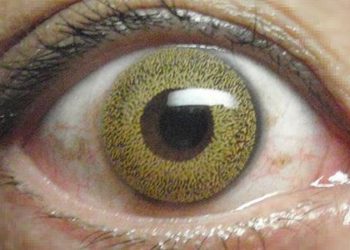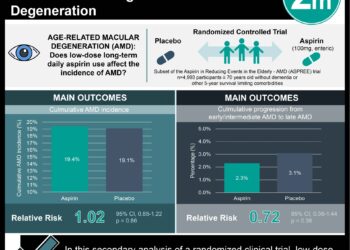The AREDS2: No benefit from additional carotenoid and omega-3-fatty acid supplementation to original AREDS formulation [The Classics Series]
1. There was no added benefit observed with adding lutein and zeaxanthin, omega-3-fatty acids (DHA and EPA), or the combination to the original AREDS formulation in reducing progression to advanced age-related macular degeneration (AMD) in high-risk patients.
2. Because of the suspected association between beta-carotene and increased lung cancer risk in smokers, beta-carotene can be replaced by lutein and zeaxanthin in recent and current smokers requiring AREDS supplementation.
Original Date of Publication: May 2013
Study Rundown: The Age-Related Eye Disease Study 1 (AREDS1) demonstrated lower progression to advanced AMD and risk of moderate vision loss in high-risk patients with the supplementation of high-dose zinc and antioxidants, which became known as the AREDS1 formulation. Since the original trial, new evidence suggested that other carotenoids (lutein and zeaxanthin) and omega-3-fatty acids (DHA and EPA) could potentially further reduce the risk of progression. In smokers, it was also noted that beta-carotene may be associated with a higher risk of incident lung neoplasm.
The AREDS2 was a randomized controlled trial that sought primarily to evaluate the effects adding these carotenoids and omega-3-fatty acids to the original AREDS1 formulation on the risk of progression to advanced AMD. The investigators also explored the effects of eliminating beta-carotene from and lowering the dose of zinc in the original formulation. The study found that there was no added benefit of these new supplements in any combination on the progression of AMD or in preventing vision loss. Similarly, eliminating beta-carotene and lowering zinc showed no statistically significant effect. In patients with low lutein and zeaxanthin intake at baseline, supplementing these carotenoids may offer some benefit, as demonstrated in the study subgroup analyses. Given the potential link between beta-carotene and lung cancer in recent and current smokers, it was suggested that substituting lutein and zeaxanthin may be a reasonable option in this patient population.
Click to read the study in JAMA
In-Depth [randomized controlled trial]: This multicenter, randomized, controlled trial recruited patients between 55-80 years of age, at high-risk for developing advanced AMD (i.e., bilateral large drusen or large drusen in 1 eye and advanced AMD in the other eye), who had agreed to stop pre-existing supplements containing study therapies (lutein, zeaxanthin, DHA, EPA, vitamin C/E, beta carotene, zinc, copper), and demonstrated reasonable adherence (i.e., took at least 75% of supplements during run-in phase). Exclusion criteria included obscured ocular media preventing macular photographs, any eye disease that could complicate assessment of AMD, previous ocular non-cataract surgery, and systemic disease with poor 5-year survival (e.g., oxalate kidney stones, Wilson disease, hemochromatosis, lung cancer). A total of 4203 patients were randomized to either i) lutein and zeaxanthin, ii) DHA and EPA, iii) lutein, zeaxanthin, DHA ,and EPA, or iv) placebo. These supplements were taken in addition to the original AREDS formulation, which consisted of vitamin C/E, beta carotene, zinc, and copper. Consenting patients underwent a secondary randomization to evaluate variations of the AREDS formulation, specifically regimens with i) no beta-carotene, ii) low dose zinc, iii) no beta carotene and low dose zinc, or iv) the original AREDS formula. Patients were followed for 5 years. The primary outcome was progression/treatment for advanced AMD at 5 years.
Unfortunately, none of the additional supplement combinations significantly delayed progression to advanced AMD when compared to placebo: i) lutein and zeaxanthin (HR 0.90, 98.7%CI 0.76-1.07, p = 0.12), ii) DHA and EPA (HR 0.97, 98.7%CI 0.82-1.16, p = 0.70), iii) lutein, zeaxanthin, DHA, and EPA (HR 0.89, 98.7%CI 0.75-1.06, p = 0.10). With regards to adjusting the original AREDS formula, lowering zinc (HR 1.06, 95%CI 0.95-1.19, p = 0.32) and eliminating beta-carotene (HR 1.07, 95%CI 0.94-1.20, p = 0.31) also did not significantly reduce progression rate compared to placebo. A subgroup analysis demonstrated that patients in the lowest quintile of baseline lutein and zeaxanthin dietary intake may benefit from lutein and zeaxanthin supplementation (HR 0.74, 95%CI 0.59-0.94, p = 0.01). There were no statistically significant differences between the groups in terms of the risk of serious adverse events.
Image: PD
©2017 2 Minute Medicine, Inc. All rights reserved. No works may be reproduced without expressed written consent from 2 Minute Medicine, Inc. Inquire about licensing here. No article should be construed as medical advice and is not intended as such by the authors or by 2 Minute Medicine, Inc.






